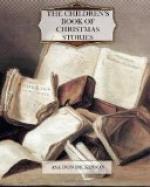So he sang the fairies’ rhyme and out of the air dropped a wee cap for him. For a moment the wonder had him, but the next he was clapping the cap on his head and crying:
“Spain!”
Then—whist—up the chimney he went after the fairies, and before he had time to let out his breath he was standing in the middle of Spain, and strangeness all about him.
He was in a great city. The doorways of the houses were hung with flowers and the air was warm and sweet with the smell of them. Torches burned along the streets, sweetmeat-sellers went about crying their wares, and on the steps of the cathedral crouched a crowd of beggars.
“What’s the meanin’ o’ that?” asked Teig of one of the fairies. “They are waiting for those that are hearing mass. When they come out, they give half of what they have to those that have nothing, so on this night of all the year there shall be no hunger and no cold.”
And then far down the street came the sound of a child’s voice, singing:
“Listen all ye, ‘tis the Feast o’ St. Stephen, Mind that ye keep it, this holy even”.
“Curse it!” said Teig; “can a song fly afther ye?”
And then he heard the fairies cry “Holland!” and cried “Holland!” too.
In one leap he was over France, and another over Belgium; and with the third he was standing by long ditches of water frozen fast, and over them glided hundreds upon hundreds of lads and maids. Outside each door stood a wee wooden shoe empty. Teig saw scores of them as he looked down the ditch of a street.
“What is the meanin’ o’ those shoes? " he asked the fairies.
“Ye poor lad!” answered the wee man next to him; “are ye not knowing anything? This is the Gift Night of the year, when every man gives to his neighbour.”
A child came to the window of one of the houses, and in her hand was a lighted candle. She was singing as she put the light down close to the glass, and Teig caught the words:
“Open your door an’ greet ye the stranger—
For ye mind that the wee Lord had naught but a manger.
Mhuire
as truagh!”
“’Tis the de’il’s work!” cried Teig, and he set the red cap more firmly on his head.
“I’m for another country.”
I cannot be telling you a half of the adventures Teig had that night, nor half the sights that he saw. But he passed by fields that held sheaves of grain for the birds and doorsteps that held bowls of porridge for the wee creatures. He saw lighted trees, sparkling and heavy with gifts; and he stood outside the churches and watched the crowds pass in, bearing gifts to the Holy Mother and Child.
At last the fairies straightened their caps and cried, “Now for the great hall in the King of England’s palace!”
Whist—and away they went, and Teig after them; and the first thing he knew he was in London, not an arm’s length from the King’s throne. It was a grander sight than he had seen in any other country. The hall was filled entirely with lords and ladies; and the great doors were open for the poor and the homeless to come in and warm themselves by the King’s fire and feast from the King’s table. And many a hungry soul did the King serve with his own hands.




